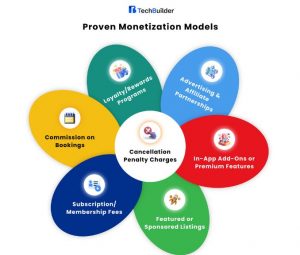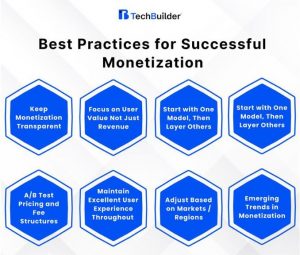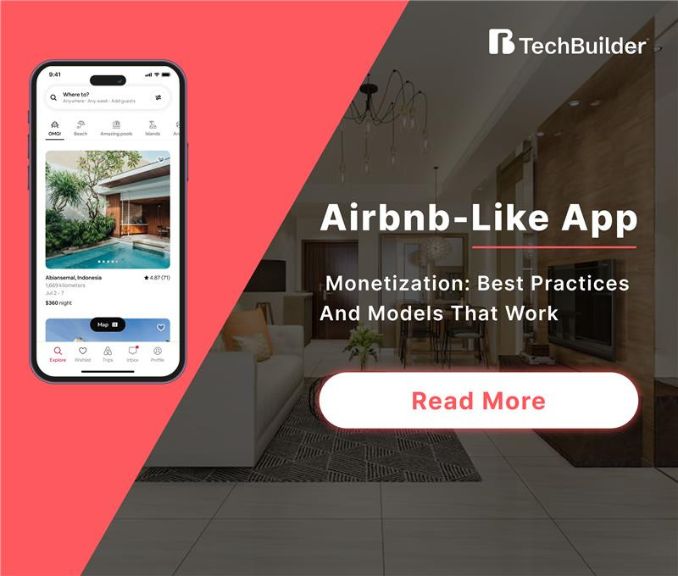In the fast changing world of travel technology and peer-to-peer marketplaces – developing an Airbnb-like app is no longer only about connecting hosts and guests. It is about building a long-term revenue engine, providing value, and growing profitably. To stand out – you need more than just a fantastic user experience and listings – you also need effective, tested, and transparent monetisation tactics.
Airbnb is a prime example: in 2024, the company made $11.1 billion in revenue, up 12.1% year on year, with a gross booking volume of $81.8 billion. These numbers show two things: first, the demand is strong; second, there is a big opportunity for anyone who can monetize well.
For any startup or established business considering or running an Airbnb-like app, this article will walk through what monetization really means, the models that are working today, and how you can design your revenue strategy so it aligns with growth, trust, and user satisfaction.
Understanding Monetization for Airbnb-Like Apps
Before choosing a monetization model – it’s crucial to understand what you’re monetizing, where value is created, and how that maps to user behavior. Here are the key dimensions:
Monetization for an Airbnb-like app means the ways by which your platform converts value (listings + bookings + user trust + service quality) into steady revenue. It includes all fees, commissions, premium services, and additional “extras”.
-
Core Components of Value Creation
At its heart, an Airbnb-like app creates value by bringing together two groups: hosts who have properties or services to offer and guests looking for authentic, convenient stays. The platform earns its place by making -that match safe, seamless, and trustworthy. Listings, secure payments, dispute resolution, ratings, and customer support are all value-adding services. The more efficiently and transparently your app does these things, the more both sides are willing to pay for them. This foundation is what makes monetization possible.
-
Trade-Offs to Manage
Monetization in an Airbnb-like app – is a balancing act. Setting your commission or fees too high risks discouraging hosts or frightening away visitors – while setting them too low may make it difficult to meet costs or support expansion. You must also strike a balance between simplicity and flexibility. A simple price plan is easier for customers to comprehend, but it may limit revenue potential, whereas a complex structure can confuse and frustrate them. Successful apps regularly test and tweak these trade-offs to ensure profitability and user trust.
-
Key Metrics to Track
Data is the compass that guides your monetisation approach. Important KPIs include- Gross Booking Value (GBV) – which is the entire amount of money that flows through your app, and your take rate. Conversion rate – visitors who make a booking, average transaction size, and repeat booking rate – are very essential – since they represent the strength of your marketplace and whether your price is reasonable. Tracking these data on a regular basis allows you to adjust pricing and features to increase income while maintaining customer satisfaction.
-
Trend Observation & Current Stats
Keeping an eye on market trends ensures your monetization model stays relevant. For example, Airbnb reported $11.1 billion in revenue in 2024 with a gross booking volume of $81.8 billion showing how large and resilient the sector is. Airbnb’s GBV hit $24.5 billion in just the first quarter of 2025. Such numbers demonstrate – that demand for peer-to-peer rentals is increasing worldwide. Trends like micro-subscriptions, dynamic pricing powered by AI, and embedded financial services are shaping how new platforms monetize. Watching these shifts helps you innovate instead of just copying competitors.
Proven Monetization Models
When developing an Airbnb-like app – numerous monetisation approaches have been shown to be effective. Here are some of the best, explained simply:

-
Commission on Bookings
This is one of the most common and straightforward ways to monetize. When a guest arranges a stay or utilises a service through your platform – your app receives a small share of the transaction. For example, you might charge the host a commission, and/or add a fee to the guest. Because you only earn when a booking is made – this aligns your incentives with good service, trust, and ensuring users (hosts & guests) keep using the platform.
-
Subscription/Membership Fees
Some hosts or guests are willing to pay a recurring price (monthly or yearly) in exchange for exclusive privileges such as increased visibility, analytics, premium assistance, discounts, and so on. Subscription or membership programs provide more predictable revenue, allowing for better planning and scalability of operations. It works especially effectively if your app offers ongoing value rather than just one-time sales.
-
Featured or Sponsored Listings
Hosts want visibility. If your platform lets them pay to “boost” their property or service — e.g., appear higher up in search results, get a special badge, or be featured on the homepage — this can be an attractive option. Users see more bookings for featured listings – so they often accept paying extra for better exposure.
-
In-App Add-Ons or Premium Features
Aside from basic listings and reservations, extra services or enhancements are available, including improved analytics, premium support, concierge services, insurance, cleaning, and even photo-shoot services. These add-ons allow you to boost revenue per user without charging everyone, just those who want more.
-
Advertising & Affiliate Partnerships
Once your app has generated enough traffic and usage, you can allow relevant marketers or partners to display advertising or offers to guests or hosts. Travel insurance firms, local experience providers, furniture and décor businesses – and other entities may collaborate with you. Affiliate marketing – which involves referring users to third-party services in exchange for a commission – can also be integrated into articles, guides, or recommendations.
-
Cancellation/Penalty Charges
Cancellations and no-shows result in costs for both the hosts and the platform. Implementing well-thought-out cancellation rules (with fines or penalties) reduces loss and encourages users to commit more seriously. For example, a guest may pay more for flexible cancellation, or if they cancel too late, a half price applies. This approach must be fair and well defined in order to avoid consumer frustration.
-
Loyalty/Rewards Programs
Loyalty schemes can help stimulate – repeat bookings and retain users. Discounts, exclusive bonuses, priority support, or early access to coveted listings – are all possible rewards. These programs increase clients’ lifetime value and engagement.
Best Practices for Successful Monetization
Simply selecting a revenue model is not sufficient. To ensure your Airbnb-like app monetises well, adopt these best practices:

Keep Monetization Transparent
Users need to understand what they are paying for. Hidden costs, shocks at checkout, and confusing terms (such as cancellation restrictions) erode trust. Before making a booking ensure that all fees, commissions, and other costs are clearly stated. When hosts and guests believe they are being treated properly and understand exactly what they are paying, they are more likely to remain loyal and suggest your app.
Focus on User Value, Not Just Revenue
Monetization should always enhance the user experience, not degrade it. Users may leave if they feel pressured to buy (or are continuously upsold), or if the app is packed with advertisements. Always enquire: “Does this premium feature or fee bring real value?” If so, promote it; otherwise, don’t bother users with it. Satisfied users are more valuable than onetime revenue spikes.
Start with One Model, Then Layer Others
It’s often best to begin with the simplest monetization strategy (e.g., commission on bookings) and do that really well. Once you have traction, you can add others — for example, premium features, or sponsored listings. This will stop you from – overloading users or making the business too complex – too quickly.
Use Data & Analytics to Inform Decisions
Collect data on how users engage with the app – such as where they drop off, which features they utilise the most, when they cancel, and so on. Use this to fine-tune your pricing, change commission rates, & figure out which premium features – are most tempting. Without data, you’re guessing; with data, you can be specific.
A/B Test Pricing and Fee Structures
Different users respond differently to fees and premium offers. A/B testing means showing slightly different pricing structures to subsets of users and seeing what works best (in terms of bookings, revenue, retention). This allows you to optimise your revenue without negatively impacting user activity.
Maintain Excellent User Experience Throughout
Monetization shouldn’t make your app feel like a marketplace full of “money grabs.” It should feel smooth, fair, and fast. Payment flows should be easy; the user interface should clearly state what is included; features should load quickly; and cancellations and assistance should be handled efficiently. Good UX keeps users and encourages return visits – which is important for long-term profitability.
Adjust Based on Markets / Regions
What works in one country might not work in another. User expectations for service fees, cancellation policies, and pricing sensitivity vary by culture and by income level. So understand your target regional markets: perhaps hosts in one location anticipate a modest commission – whilst guests in another region tolerate greater costs provided the service is quality. Adjust your monetisation strategy to line – with local standards and competing offers.
Emerging Trends in Monetization
The world of Airbnb-like apps is evolving fast, and monetization strategies are evolving with it. Staying ahead of trends can help you attract users and increase revenue.
-
Micro-Subscriptions and Pay-Per-Use Add-Ons
Rather than charging a high one-time cost – several Airbnb-like apps now offer tiny, flexible memberships or optional add-ons. For example, customers may pay an additional fee for early check-in, travel insurance, or concierge services. These micro-fees increase the app’s accessibility while also generating cash – from customers willing to pay for convenience or premium features.
-
AI-Powered Dynamic Pricing
Dynamic pricing combines artificial intelligence & machine learning – to alter listing rates in response to demand, seasonality, local events, & booking habits. During instances of strong demand, hosts earn more while guests continue to receive affordable prices. This trend increases revenue while keeping your platform attractive & fair.
-
Embedded Fintech Solutions
Modern apps integrate fintech services like escrow payments, buy-now-pay-later (BNPL) options, and in-app insurance. These features increase user trust, reduce friction during transactions, and create additional revenue streams, especially from service fees or transaction charges.
-
Loyalty and Rewards Programs
Rewarding repeat users increases retention and long-term engagement. Users that make regular bookings may earn points, discounts, or unique perks. Loyalty programs improve lifetime value and foster a feeling of community – making guests and hosts more likely to choose your app over competitors.
-
Personalized Premium Services
Customisation becomes – increasingly important. Apps provide bespoke premium services – such as curated experiences, personalised travel recommendations, and better analytics for hosts. Personalised offers boost customer pleasure and justify increased rates – for those seeking an upgraded experience.
Common Mistakes to Avoid
Even with a strong concept, many Airbnb-like apps struggle with monetization because of avoidable mistakes.
-
Overcomplicating the Pricing Structure
Many apps fail because the fees, commissions, or cancellation procedures – are unclear. Users become dissatisfied – when they don’t understand exactly what they’re paying for – which can result in abandoned bookings or lost trust. Maintain trust and encourage repeat business by keeping your pricing clear, simple, and transparent.
-
Copying Competitors Blindly
While it may be easy to copy Airbnb or other popular platforms, what works for them may not fit for your target audience, niche, or area. Blindly copying competitors might lead to misaligned features or pricing, disappointing your customers. You must focus on understanding your target market and establishing monetisation strategies that meet your users’ needs.
-
Ignoring User Feedback
Feedback from hosts and guests is invaluable. If users believe they have been overcharged, undervalued, or confused by fees – they may depart for a competitor. Gather feedback on a regular basis, analyse complaints or suggestions, & alter your monetisation techniques as needed to retain & satisfy your users.
-
Prioritizing Short-Term Revenue Over Long-Term Growth
Aggressive monetization may generate quick profit – but can harm long-term growth. Users may exit your app – if fees are unjust, promotions are overly aggressive, or the experience is transactional rather than user-friendly. A sustainable method strikes a balance between revenue growth, user delight, & trust.
Conclusion
Adding fees is not enough to successfully monetise an Airbnb-like app. The goal is to select the best combination of proven income models, maintain transparency, prioritise user value – and constantly change based on – data, industry trends, and feedback.
Avoiding typical pitfalls like – overcomplicating fees, blindly mimicking competitors, or prioritising short-term profits – will help your app achieve long-term growth, user trust, and profitability.
FAQ
Q1: What is the most effective monetization model for an Airbnb-like app?
A: Commission-based models are the most prevalent and scalable – however, combining them with premium services, subscriptions, or add-ons – frequently results in more revenue.
Q2: How much commission should I charge hosts or guests?
A: Most successful apps charge 10–15% of the booking amount – but it depends on your market, niche, and value-added services. You must consistently test and change based on user input and behaviour.
Q3: Can small startups compete with Airbnb in monetization?
A: Yes, small apps can attract and maintain users – while also making cash by providing niche services, unique user experiences – or novel monetisation tactics.
Q4: Should I prioritize revenue or user experience?
A: User experience should come first. Monetisation tactics should add value, not frustrate users. Customer satisfaction leads to repeat bookings and long-term revenue growth.
Q5: How do emerging trends like AI pricing affect monetization?
A: AI-driven dynamic pricing increases revenue by altering rates – based on demand, seasonality, and user behaviour – benefiting both hosts and visitors.









































































